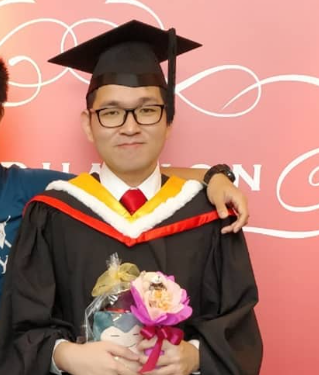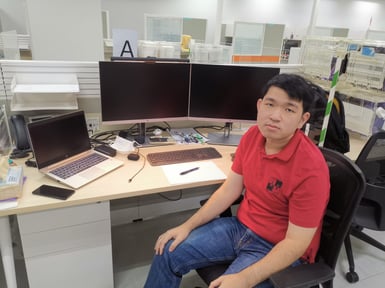You may not realise it, but it’s likely you have been affected in some way by the global shortage of semiconductors recently.
Perhaps you’re currently still waiting for the new car you ordered months ago to be ready? Or you’re desperately searching the internet to locate a PS5 games console in stock?

Well, these delays are due to a shortage of semiconductors – also known as integrated circuits or chips. As well as cars and games consoles, they’re also found in smartphones and white goods.
With the current shortage and given the importance of semiconductors in global supply chains, a research collaboration in Singapore is hoping to address the issue.
Newcastle University’s Singapore campus has partnered with GlobalFoundries, a major international manufacturer of semiconductors, to establish a new PhD project, aiming to improve the reliability of the process to manufacture integrated circuits and help future supplies.
We spoke to the successful PhD candidate, Martin Lim, to find out more.
Improving the manufacturing process of integrated circuits
I was offered the opportunity to take part in the PhD programme just before I graduated from my joint degree programme with Newcastle University and the Singapore Institute of Technology (SIT), in Electrical Power Engineering.
This opportunity meant that I would be able to try and expand the methods that I was using to approach real-life issues that needed to be solved. I was really interested in the manufacturing process of semiconductors and thought that the PhD would give me the chance to try out more data-analytical based research and expand the way I think of solutions. In electrical engineering, all our solutions are well-defined!
I started the PhD in March 2020, and I have already learnt how quality control is done throughout every process in the semiconductor manufacturing process. I have also investigated the historical research carried out on improving quality control on most processes over the years. It has become clear to me that using machine learning is now taking a more active role in semiconductor manufacturing.

During the course of my research, I will be applying machine learning techniques to data from quality checks. This will allow predictions to be made about which part of the manufacturing process may cause quality issues. Extra control measures can then be implemented into the process to reduce the number of defects. The use of machine learning to provide real-time predictive quality assurance data in chip manufacturing will improve the reliability of the process and result in less wastage.
I am particularly enjoying learning about the complexity and importance behind manufacturing and how hard it is to maintain quality control. Machine learning application in manufacturing isn’t very well established yet, and there are many more things to explore and new solutions that can be used to increase their efficiency.
Partnering with GlobalFoundries
Newcastle University in Singapore has partnered with GlobalFoundries, a major international manufacturer of semiconductors, to make Martin’s PhD project possible, with additional funding provided by the Singapore Economic Development Board. Martin’s research is of high importance to GlobalFoundries, who manufacture chips in very large quantities.
I have a long-standing connection with Jonathan Ong at GlobalFoundries. It started when they offered internships to Newcastle University and SIT undergraduate engineering students. Jonathan was very impressed with the skills of the intern students and this led to conversations about collaboration at PhD level. The project is progressing successfully, thanks to our excellent team which comprises of my colleague Dr Chin, and Jon and Tommy from GlobalFoundries. We are exploring more collaborative research projects between Newcastle University in Singapore and GlobalFoundries.
Dr Anurag Sharma, Assistant Professor in Electrical Power Engineering and Martin's PhD Supervisor
About Newcastle University in Singapore
Newcastle University has had a home in Singapore since 2007, providing a regional hub for international research collaborations and industry partnerships. In 2009, the University joined forces with the Singapore Institute of Technology (SIT).
Undergraduate degree programmes are delivered in partnership with SIT to provide world-class education in an international environment. Postgraduate students are immersed in a hub for research, collaboration and innovation at the Newcastle Research & Innovation Institute (NewRIIS).
To date, over 1,000 students have graduated from our Singapore campus, and they are now shaping the future in the fields of Science and Engineering.
Find out more
Learn more about our ambitions to build on our strengths in innovation, engineering and technology to continue to provide solutions for the future by clicking the button below.

